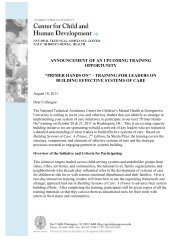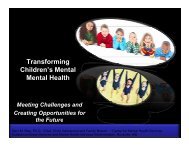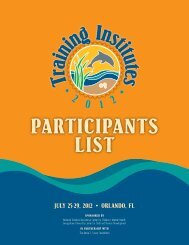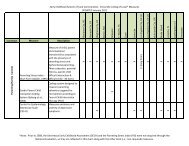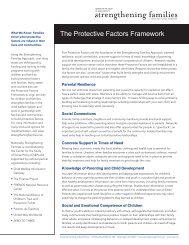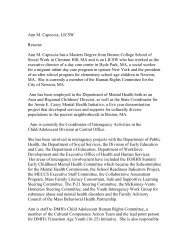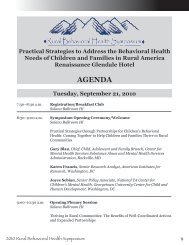Training Institutes 2012 - National Technical Assistance Center for ...
Training Institutes 2012 - National Technical Assistance Center for ...
Training Institutes 2012 - National Technical Assistance Center for ...
You also want an ePaper? Increase the reach of your titles
YUMPU automatically turns print PDFs into web optimized ePapers that Google loves.
INSTITUTES<br />
INSTITUTE #30 8:30 AM FRIDAY • 1:30 PM SATURDAY • SUN D<br />
An In<strong>for</strong>mation Management Strategy <strong>for</strong> Child-Serving Systems:<br />
The Total Clinical Outcomes Management (TCOM) Approach<br />
OBJECTIVES—Participants will learn:<br />
1. To distinguish between the five major types of businesses including the differences between a service and a<br />
trans<strong>for</strong>mational offering<br />
2. To identify the key principles of communimetric measurement as it applies to managing a child-serving system<br />
3. To describe three methods <strong>for</strong> tracking the outcomes of interventions<br />
4. To describe four barriers to managing outcomes and strategies to overcome them<br />
This Institute will focus on an effective in<strong>for</strong>mation management strategy <strong>for</strong> systems of care—Total Clinical Outcomes<br />
Management (TCOM). Traditionally, child-serving systems have been organized, financed, and managed as if they were<br />
service industries. However, child-serving systems are actually comprised of trans<strong>for</strong>mational offerings, not services.<br />
This workshop teaches participants how to define and manage trans<strong>for</strong>mational offerings using the TCOM approach,<br />
which is a theory-driven approach to managing change processes. The underlying theory of TCOM is completely<br />
congruent with system of care philosophy. Faculty will present the philosophy, strategy, and tactics of TCOM with<br />
examples incorporated throughout.<br />
The in<strong>for</strong>mation and strategies to be shared in this session are based on implementations of TCOM and the Child and<br />
Adolescent Needs and Strengths in 27 states in the United States, a number of Canadian Provinces, and applications in<br />
Asia and Europe. Detailed in<strong>for</strong>mation will be provided based on the experience in implementing the approach at EMQ<br />
Families First, a large child-serving agency in Cali<strong>for</strong>nia.<br />
Specific topics to be covered include:<br />
• The nature of the business of helping children and families and how this impacts management<br />
• The importance of a theory of measurement that embraces a shared vision, philosophy, and cultural and<br />
developmental sensitivity<br />
• The challenges of implementing an outcomes management process in child-serving systems and strategies to<br />
overcome these challenges<br />
• The impact of understanding outcomes in child-serving systems at the child, program, and system levels<br />
The session will include presentation, discussion, and small group activities. The faculty team includes the perspectives<br />
of two national experts in outcomes management, one who works at the system level and one who works at the<br />
program/agency level and an experienced clinician and administrator who focuses on the impact at the child level.<br />
MODERATOR/PRESENTER: John Lyons, Ph.D., Professor, Psychology, University of Ottawa, Ottawa, ON<br />
Lise Bisnaire, Ph.D., Director, Autism Program—Eastern Ontario, Children’s Hospital of Eastern Ontario, Ottawa, ON<br />
Abram Rosenblatt, Ph.D., Adjunct Professor, Department of Psychiatry, University of Cali<strong>for</strong>nia San Francisco, San<br />
Francisco, CA<br />
62 <strong>Training</strong> <strong>Institutes</strong> <strong>2012</strong>



